Nature: How to inhibit tumor growth by Diet intervention?
- Why Botulinum Toxin Reigns as One of the Deadliest Poisons?
- FDA Approves Pfizer’s One-Time Gene Therapy for Hemophilia B: $3.5 Million per Dose
- Aspirin: Study Finds Greater Benefits for These Colorectal Cancer Patients
- Cancer Can Occur Without Genetic Mutations?
- Statins Lower Blood Lipids: How Long is a Course?
- Warning: Smartwatch Blood Sugar Measurement Deemed Dangerous
Nature: How to inhibit tumor growth by Diet intervention?
- Red Yeast Rice Scare Grips Japan: Over 114 Hospitalized and 5 Deaths
- Long COVID Brain Fog: Blood-Brain Barrier Damage and Persistent Inflammation
- FDA has mandated a top-level black box warning for all marketed CAR-T therapies
- Can people with high blood pressure eat peanuts?
- What is the difference between dopamine and dobutamine?
- How long can the patient live after heart stent surgery?
Nature: How to inhibit tumor growth by Diet intervention?
A healthy diet helps maintain a healthy weight or lose weight, thereby reducing the risk of cancer.
Our diet affects health in many ways. It is generally believed that a healthy diet can reduce the risk of cancer. For example, diet has a great influence on weight, and obesity can cause 13 different types of cancer. A healthy diet helps maintain a healthy weight or lose weight, thereby reducing the risk of cancer.
In addition to reducing the risk of cancer, diet can also help cancer patients inhibit tumor growth?
In fact, people generally think that a low-glycemic diet can inhibit tumor growth by lowering blood sugar and insulin levels, but there is little knowledge about whether other nutrient-related changes also have an impact. Since dietary intervention can change the level of metabolites in the tumor microenvironment, it is possible to inhibit tumor growth by affecting the metabolism of cancer cells .
Scholars from the Institute of Cancer Research at the Massachusetts Institute of Technology pointed out that a low-glycemic diet can inhibit tumor growth by altering lipid metabolism . Related content was published in the international journal Nature on October 20 with a research paper entitled “Low glycaemic diets alter lipid metabolism to influence tumor growth”.
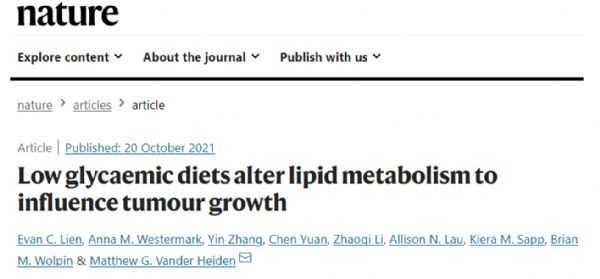 Source: https://doi.org/10.1038/s41586-021-04049-2
Source: https://doi.org/10.1038/s41586-021-04049-2
Although calorie restriction (CR) and ketogenic diet (KD) are generally considered to limit tumor growth by lowering blood sugar and insulin levels, researchers have found through experiments that only CR can inhibit the growth of specific tumor allogenes in mice, and Only KD can significantly reduce fasting plasma insulin levels. This indicates that lowering blood sugar and insulin may not fully explain the effect of CR on tumor growth, and there are other mechanisms that inhibit tumor growth.
The researchers further measured the plasma and tumor interstitial (TIF) levels of metabolites in tumor mice fed a control diet, CR or KD. The results showed that KD reduced blood glucose levels, but did not reduce the glucose level of TIF, while CR reduced the glucose level of TIF from ~1.6mM to ~0.8mM. The effect of CR on TIF glucose may help inhibit tumor growth.
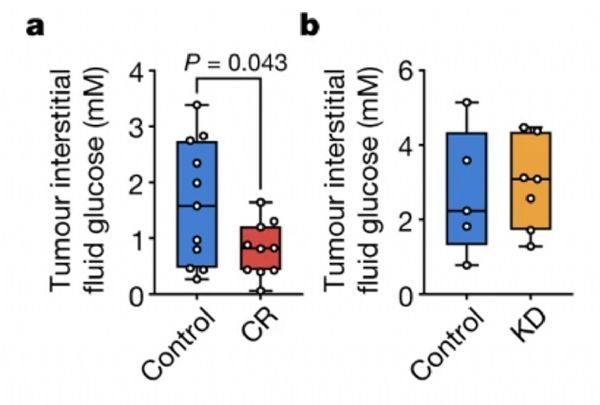 Glucose concentration in TIF of mouse subcutaneous AL1376 tumor
Glucose concentration in TIF of mouse subcutaneous AL1376 tumor
Next, the study found a significant difference in the effects of CR and KD on fatty acid levels. KD increases many fatty acids in plasma and TIF, while CR reduces the levels of almost all fatty acids. Therefore, the reduced tumor availability of lipids and fatty acids is unique to CR, and lipid restriction in the environment may help CR inhibit tumor growth.
To evaluate how lipid deficiency affects fatty acid metabolism in cells, the researchers cultured cells in a lipid-deficient medium containing only trace fatty acids. It is worth noting that lipid deficiency does not sensitize AL1376 cells to any antiproliferative effects of glucose restriction, indicating that the combination of these two CR-mediated effects alone may not explain the slowing of tumor growth.
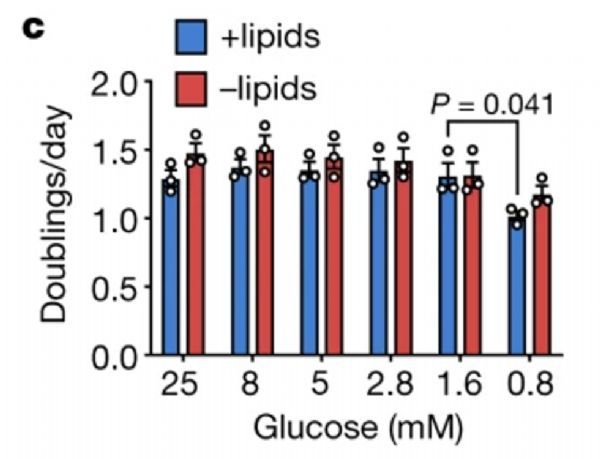 The doubling time of AL1376 cells cultured in lipidated and defatted medium containing the specified glucose concentration
The doubling time of AL1376 cells cultured in lipidated and defatted medium containing the specified glucose concentration
Further research found that the up-regulation of stearoyl-CoA desaturase (SCD), which synthesizes monounsaturated fatty acids, is necessary for cancer cell proliferation in a lipid-poor environment. SCD activity is essential for the growth of cancer cells in a lipid-deficient environment, and CR will damage the activity of tumor SCD, resulting in an imbalance between unsaturated fatty acids and saturated fatty acids, thereby slowing the growth of tumors .
Then, the researchers explored whether high-fat calorie restriction (HFCR) diets can increase systemic lipid availability to save CR-mediated damage to SCD activity and tumor growth, and how dietary fat content can change systemic lipid availability. The results show that through a higher-fat CR diet, forcing cancer cells to express SCD or increasing circulating lipid levels can enhance the resistance to the CR effect.
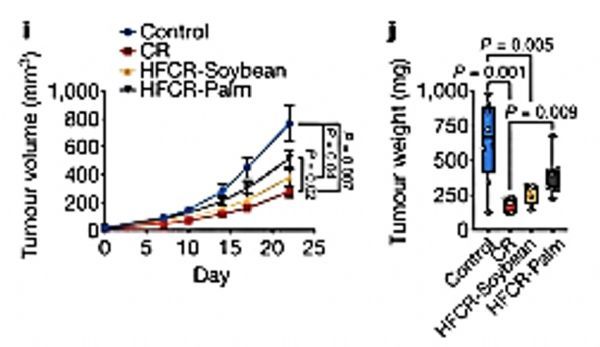 Tumor volume and weight of mouse AL1376 tumor
Tumor volume and weight of mouse AL1376 tumor
In contrast, although KD also impairs the activity of tumor SCD, the increase in KD-driven lipid supply maintains the proportion of unsaturated fatty acids in tumors. Changing the fat composition of KD can increase the level of tumor saturated fatty acids and reduce tumors. SCD activity slows down the growth of tumors .
Studies have shown that the match between the fatty acid desaturation activity of tumors caused by diet and the availability of specific fatty acid types determines whether a low-glycemic diet will inhibit tumor growth. The interaction between the fat content of the diet and the suppression of tumor SCD induced by a low-glycemic diet leads to an imbalance between saturated fatty acids and unsaturated fatty acids, which is the mechanism by which a low-glycemic diet inhibits tumor growth.
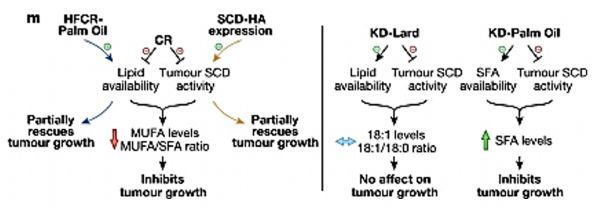 A model that summarizes how a low-glycemic diet changes lipid metabolism to affect tumor growth
A model that summarizes how a low-glycemic diet changes lipid metabolism to affect tumor growth
It should be pointed out that a low-glycemic diet may not be the correct intervention method for all cancer patients. Both CR and KD regimens are difficult to maintain, and weight loss caused by CR may limit treatment options. In addition, although SFA-rich KD can inhibit the growth of mouse tumors , studies have shown that long-term consumption of SFA can have negative effects, including cancer cell metastasis and cardiovascular disease.
This study shows how diet changes the availability of tumor metabolites and affects the metabolism of cancer cells, thereby inhibiting tumor growth, and provides guidance on how to incorporate dietary interventions to improve the care of cancer patients.
Reference:Lien E C, Westermark A M, Zhang Y, et al. Low glycaemic diets alter lipid metabolism to influence tumour growth[J]. Nature, 2021: 1-6.
Nature: How to inhibit tumor growth by Diet intervention?
(source:internet, reference only)
Disclaimer of medicaltrend.org
Important Note: The information provided is for informational purposes only and should not be considered as medical advice.



